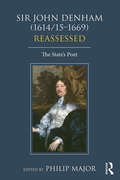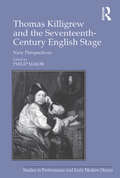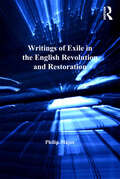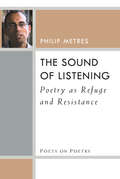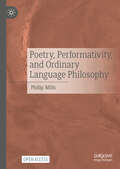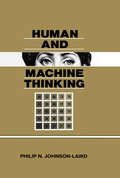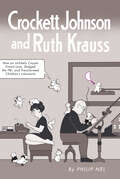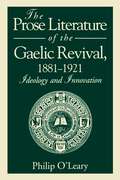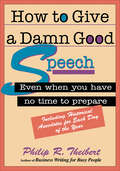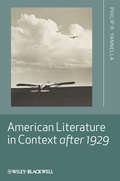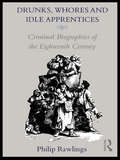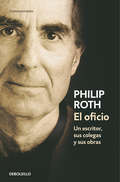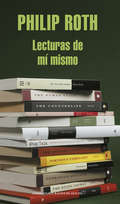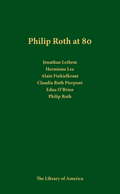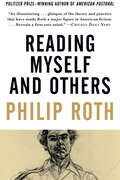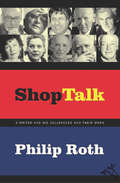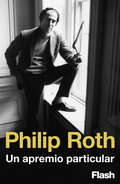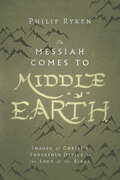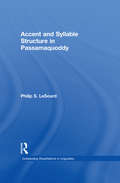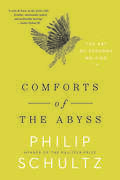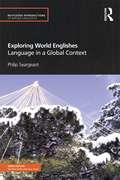- Table View
- List View
Sir John Denham (1614/15–1669) Reassessed: The State's Poet
by Philip MajorSir John Denham (1614/15–1669) Reassessed shines new light on a singular, colourful yet elusive figure of seventeenth-century English letters. Despite his influence as a poet, wit, courtier, exile, politician and surveyor of the king's works, Denham, remains a neglected figure. The original essays in this interdisciplinary collection provide the sustained modern critical attention his life and work merit. The book both examines for the first time and reassesses important features of Denham's life and reputations: his friendship circles, his role as a political satirist, his religious inclinations, his playwriting years, and the personal, political and literary repercussions of his long exile; and offers fresh interpretations of his poetic magnum opus, Coopers Hill. Building on the recent resurgence of scholarly interest in royalists and royalism, as well as on Restoration literature and drama, this lively account of Denham's influence questions assumptions about neatly demarcated seventeenth-century chronological, geographic and literary boundaries. What emerges is a complex man who subverts as well as reinforces conventional characterisations of court wit, gambler and dilettante.
Thomas Killigrew and the Seventeenth-Century English Stage: New Perspectives (Studies in Performance and Early Modern Drama)
by Philip MajorDespite his significant influence as a courtier, diplomat, playwright and theatre manager, Thomas Killigrew (1612-1683) remains a comparatively elusive and neglected figure. The original essays in this interdisciplinary volume shine new light on a singular, contradictory Englishman 400 years after his birth. They increase our knowledge and deepen our understanding not only of Killigrew himself, but of seventeenth-century dramaturgy, and its complex relationship to court culture and to evolving aesthetic tastes. The first book on Killigrew since 1930, this study re-examines the significant phases of his life and career: the little-known playwriting years of the 1630s; his long exile during the 1640s and 1650s, and its personal, political and literary repercussions; and the period following the Restoration, when, with Sir William Davenant, he enjoyed a monopoly of the London stage. These fresh accounts of Killigrew build on the recent resurgence of interest in royalists and the royalist exile, and underscore literary scholars' continued fascination with the Restoration stage. In the process, they question dominant assumptions about neatly demarcated seventeenth-century chronological, geographic and cultural boundaries. What emerges is a figure who confounds as often as he justifies traditional labels of dilettante, cavalier wit and swindler.
Writings of Exile in the English Revolution and Restoration
by Philip MajorWritings of Exile in the English Revolution and Restoration opens a window onto exile in the years 1640-1680, as it is experienced across a broad spectrum of political and religious allegiances, and communicated through a rich variety of genres. Examining previously undiscovered and understudied as well as canonical writings, it challenges conventional paradigms which assume a neat demarcation of chronology, geography and allegiance in this seminal period of British and American history. Crossing disciplinary lines, it casts new light on how the ruptures -- and in some cases liberation -- of exile in these years both reflected and informed events in the public sphere. It also lays bare the personal, psychological and familial repercussions of exile, and their attendant literary modes, in terms of both inner, mental withdrawal and physical displacement.
Hawthorne in Concord
by Philip Mcfarlandselective, yet scholarly biography of Hawthorne's time spent in Concord.
The Sound of Listening: Poetry as Refuge and Resistance (Poets On Poetry)
by Philip MetresPhilip Metres stakes a claim for the cultural work that poems can perform—from providing refuge to embodying resistance, from recovering silenced voices to building a more just world, in communities of solitude and solidarity. Gathering a decade of his writing on poetry, he widens our sense of poetry as a way of being in the world, proposing that poems can offer a permeability to marginalized voices and a shelter from the imperial noise and despair that can silence us. The Sound of Listening ranges between expansive surveys of the poetry of 9/11, Arab American poetry, documentary poetry, landscape poetry, installation poetry, and peace poetry; personal explorations of poets such as Adrienne Rich, Khalil Gibran, Lev Rubinstein, and Arseny Tarkovsky; and intimate dialogues with Randa Jarrar, Fady Joudah, and Micah Cavaleri, that illuminate Metres’s practice of listening in his 2015 work, Sand Opera.
Poetry, Performativity, and Ordinary Language Philosophy
by Philip MillsHow can Ordinary Language Philosophy (OLP) help us understand poetry? Against John L. Austin’s exclusion of poetic utterances as parasitical, Philip Mills explores how contemporary poetics broadens the aims and scope of OLP. Through the analysis of French and American poetry that reinterprets notions such as illocution, perlocution, and language-games, Mills develops a poetic philosophy of language, revealing its viral and transformative nature. Poetry, Performativity, and Ordinary Language Philosophy bridges philosophy and poetry, showing how poetry contaminates and reshapes our ways of thinking and being in the world, and combining the poetic and the ethical in the notion of ‘poethics.’ This Open Access book offers a new perspective on the poetic and literary potential of OLP and the intersections between the philosophy of language and poetry.
Human and Machine Thinking (Distinguished Lecture Series #Vol. 1992)
by Philip N. Johnson-LairdThis book aims to reach an understanding of how the mind carries out three sorts of thinking -- deduction, induction, and creation -- to consider what goes right and what goes wrong, and to explore computational models of these sorts of thinking. Written for students of the mind -- psychologists, computer scientists, philosophers, linguists, and other cognitive scientists -- it also provides general readers with a self-contained account of human and machine thinking. The author presents his point of view, rather than a review, as simply as possible so that no technical background is required. Like the field of research itself, it calls for hard thinking about thinking.
A Cryptography Primer
by Philip N. KleinCryptography has been employed in war and diplomacy from the time of Julius Caesar. In our Internet age, cryptography's most widespread application may be for commerce, from protecting the security of electronic transfers to guarding communication from industrial espionage. This accessible introduction for undergraduates explains the cryptographic protocols for achieving privacy of communication and the use of digital signatures for certifying the validity, integrity, and origin of a message, document, or program. Rather than offering a how-to on configuring web browsers and e-mail programs, the author provides a guide to the principles and elementary mathematics underlying modern cryptography, giving readers a look under the hood for security techniques and the reasons they are thought to be secure.
Crockett Johnson and Ruth Krauss: How an Unlikely Couple Found Love, Dodged the FBI, and Transformed Children's Literature (Children's Literature Association Series)
by Philip NelWinner of the Children’s Literature Association’s 2014 Honor Book AwardCrockett Johnson (born David Johnson Leisk, 1906–1975) and Ruth Krauss (1901–1993) were a husband-and-wife team that created such popular children's books as The Carrot Seed and How to Make an Earthquake. Separately, Johnson created the enduring children's classic Harold and the Purple Crayon and the groundbreaking comic strip Barnaby. Krauss wrote over a dozen children's books illustrated by others, and pioneered the use of spontaneous, loose-tongued kids in children's literature. Together, Johnson and Krauss's style—whimsical writing, clear and minimalist drawing, and a child's point-of-view—is among the most revered and influential in children's literature and cartooning, inspiring the work of Maurice Sendak, Charles M. Schulz, Chris Van Allsburg, and Jon Scieszka. This critical biography examines their lives and careers, including their separate achievements when not collaborating. Using correspondence, sketches, contemporary newspaper and magazine accounts, archived and personal interviews, author Philip Nel draws a compelling portrait of a couple whose output encompassed children's literature, comics, graphic design, and the fine arts. Their mentorship of now-famous illustrator Maurice Sendak (Where the Wild Things Are) is examined at length, as is the couple's appeal to adult contemporaries such as Duke Ellington and Dorothy Parker. Defiantly leftist in an era of McCarthyism and Cold War paranoia, Johnson and Krauss risked collaborations that often contained subtly rendered liberal themes. Indeed, they were under FBI surveillance for years. Their legacy of considerable success invites readers to dream and to imagine, drawing paths that take them anywhere they want to go.
The Prose Literature of the Gaelic Revival, 1881–1921: Ideology and Innovation
by Philip O'LearyThe Gaelic Revival has long fascinated scholars of political history, nationalism, literature, and theater history, yet studies of the period have neglected a significant dimension of Ireland's evolution into nationhood: the cultural crusades mounted by those who believed in the centrality of the Irish language to the emergent Irish state.This book attempts to remedy that deficiency and to present the lively debates within the language movement in their full complexity, citing documents such as editorials, columns, speeches, letters, and literary works that were influential at the time but all too often were published only in Irish or were difficult to access. Cautiously employing the terms "nativist" and "progressive" for the turnings inward and toward the European continent manifested in different authors, this study examines the strengths and weaknesses of contrasting positions on the major issues confronting the language movement. Moving from the early collecting or retelling of folklore through the search for heroes in early Irish history to the reworking of ancient Irish literary materials by retelling it in modern vernacular Irish, O'Leary addresses the many debates and questions concerning Irish writing of the period. His study is a model for inquiries into the kind of linguistic-literary movement that arises during intense nationalism.
How to Give a Damn Good Speech (30-Minute Solutions)
by Philip R. TheibertThe best advice, openings, stories, and facts for a standout speech—from a professional speechwriter for CEOs, political figures, and other top officials.Don’t let the mere thought of presenting a speech tie your stomach in knots and put you in state of sheer panic. Philip Theibert, author of Business Writing for Busy People, has written How to Give a Damn Good Speech to help you give any speech, sounding like a seasoned pro. He provides a blueprint for producing a professional, thought-provoking, friendly, and authoritative speech, even when you have very little time to prepare.How to Give a Damn Good Speech provides you with professional speech writers’ techniques to make each and every speech a powerful presentation. Theibert has done years of research and has read thousands of speeches in an effort to better illustrate his points and bring you the best examples possible. You can read the book in its entirety or, if you simply need a refresher, you can read the section that best suits your needs. This format allows you to focus on areas of your speech that most need help. Topics covered include:How to organize and write a speech100 important things you need to know about giving an effective speechInteresting and entertaining stories to use in any speechBest quotations ever heardHistorical anecdotes for each day of the yearHow to Give a Damn Good Speech, with its easy-to-read, accessible style, makes writing and giving speeches a breeze, and will prevent you from turning green the next time you’re asked to give a speech.
American Literature in Context after 1929
by Philip R. YannellaThis book situates American literature from the Great Depression to the present day in its historical contextExplores the issues that engaged American writers from 1929 to the presentDraws on a range of documents from magazine and newspaper accounts to government reports and important non-fictionThe book covers political ferment of the 1930s; post-World War II anti-Communism; post-War affluence; suburbanization and demographic change; juvenile delinquency, mental illness and the perception of the U.S. as a "sick" society; and post-1965 immigrationDesigned to be compatible with the major anthologies of literature from the periodEquips students and general readers with the necessary historical context needed to understand the writings from this period and provides original and useful readings that demonstrate how context contributes to meaning Includes a historical timeline, featuring key literary works, American presidents, and historical events
Eight Great American Short Novels
by Philip RahvThe Man Who Became a Woman by Sherwood Anderson; The Blue Hotel by Stephen Crane; Red Leaves by William Faulkner; An International Episode by Henry James; Bartleby the Scrivener by Herman Melville; Wise Blood by Flannery O'Connor; The Long March by William Styron; False Dawn by Edith Wharton
Drunks, Whores and Idle Apprentices: Criminal Biographies of the Eighteenth Century
by Philip RawlingsCriminal biographies enjoyed enormous popularity in the Eighteenth Century: today they offer us some fascinating perspectives on the period. Drunks, Whores and Idle Apprentices is the first book to reproduce a number of these biographies in full.Not only do these biographies make fascinating reading, they also raise the problem of how to read them as historical documents. The author argues that instead of trying to uncover simple themes, the most revealing thing about them is the tensions around which they were constructed.
El oficio
by Philip RothUna conversación en Turín con Primo Levi. Otra en Jerusalén con Aarón Applefeld. Otra en Praga con Ivan Kílma. Dos con Milan Kundera en Conneticut y Londres. Un encuentro con Isaac Bashevis Singer en Nueva York para hablar sobre Bruno Schulz. Un viaje a Londres para charlar con Edna OBrien. Dos retratos: Bernard Malamud y Philip Guston. Y una relectura: Saul Bellow. Todo esto compone El oficio: un escritor, sus colegas y sus obras (2001), un libro en el que Roth reflexiona, acompañado por grandes figuras de la literatura, sobre la religión, la política, la sexualidad, la supervivencia, el exilio... Sobre cómo sus vidas se asoman a su literatura. Sobre cómo su literatura recibe la influencia de la sociedad en la que viven. El lector asistirá a través de sus páginas a una lección magistral de uno de los escritores más relevantes de la literatura actual.«Roth se las arregla para sacar de sus interlocutores las convicciones que alimentan sus obras y las vulnerabilidades que los hacen humanos... Una muestra más de la claridad de su proyecto y su singular inteligencia.»The New York Times Book Review
El oficio: Un escritor, sus colegas y sus obras
by Philip RothLa historia, la religión, el impulso creador. Un gran escritor y sus diálogos con grandes escritores. Una conversación en Turín con Primo Levi. Otra en Jerusalén con Aarón Applefeld. Otra en Praga con Ivan Kílma. Dos con Milan Kundera en Conneticut y Londres. Un encuentro con Isaac Bashevis Singer en Nueva York para hablar sobre Bruno Schulz. Un viaje a Londres para charlar con Edna O'Brien. Dos retratos: Bernard Malamud y Philip Guston. Y una relectura: Saul Bellow. Todo esto compone El oficio: un escritor, sus colegas y sus obras (2001), un libro en el que Roth reflexiona, acompañado por grandes figuras de la literatura, sobre la religión, la política, la sexualidad, la supervivencia, el exilio... Sobre cómo sus vidas se asoman a su literatura. Sobre cómo su literatura recibe la influencia de la sociedad en la que viven. El lector asistirá a través de sus páginas a una lección magistral de uno de los escritores más relevantes de la literatura actual. Reseña:«Roth se las arregla para sacar de sus interlocutores las convicciones que alimentan sus obras y las vulnerabilidades que los hacen humanos... Una muestra más de la claridad de su proyecto y su singular inteligencia.»The New York Times Book Review
Lecturas de mí mismo
by Philip RothRecopilación de artículos de Philip Roth. Las entrevistas, ensayos y artículos reunidos en este volumen cubren un cuarto de siglo de la distinguida carrera del autor norteamericano. Roth habla de sí mismo, de su obra y de las controversias que ha engendrado. Estas páginas también contienen sus escritos sobre los autores de Europa oriental por los que siempre ha abogado, sobre béisbol, la narrativa norteamericana y los judíos estadounidenses. Reseña:«Un mapa certero y detallado de la poética de Roth, de sus ideas literarias y de los procesos y circunstancias de la composición de sus obras más significativas.»Javier Aparicio Maydeu, Babelia, El País
Philip Roth at 80: A Celebration
by Philip RothOn March 19, 2013, a distinguished group of writers and critics gathered at the Newark Museum's Billy Johnson Auditorium in Newark, New Jersey, to celebrate the extraordinary career and lasting literary legacy of Philip Roth on the occasion of his 80th birthday. This keepsake volume gathers remarks from the evening's speakers, a fitting tribute to the only living novelist whose work is collected in the Library of America series. Here you'll find Jonathan Lethem, hilariously recounting his first consciousness-raising encounter with Roth's work through the Kafkaesque novel The Breast; Hermione Lee, tracing the Shakespearian themes in Roth's books, from Portnoy's Complaint to The Humbling; Alain Finkielkraut, offering a deep reading of Roth's final novel, Nemesis; Claudia Roth Pierpont, assessing Roth's portrayal of women in such books as Sabbath's Theater and The Human Stain; Edna O'Brien, recalling her long friendship with Roth; and the author himself, offering a quintessentially Rothian valediction.
Reading Myself and Others (Vintage International)
by Philip RothFascinating interviews, essays, and articles spanning a quarter century on writing, baseball, American fiction, and American Jews—from the Pulitzer Prize-winning author of American Pastoral and one of the greatest writers of the 20th century. "An illuminating ... glimpse of the theory and practice that have made Roth a major figure in American fiction." —Chicago Daily News Here is Philip Roth on himself and his work and the controversies it's engendered. Here too are Roth's writings on the Eastern European writers he has always championed, and so much more. The essential collection of nonfiction by a true American master, Reading Myself and Others features his famed long interview with the Paris Review.
Shop Talk: A Writer and His Colleagues and Their Work
by Philip RothThe legendary author&’s essays and interviews explore how fellow writers from Milan Kundera to Edna O&’Brien are influenced by time, place, and politics. Writers are often deeply influenced by the time and place in which they live and write. In Shop Talk, Philip Roth, winner of a National Book Award, a Pulitzer Prize, and numerous other literary honors, explores the intimate relationship a writer&’s experience has with his or her work. In a series of essays, Roth recounts his intellectual encounters with writers, discussing with them the diverse regions from which they hail and pondering the influence of locale, politics, and history on their work. Featuring luminaries such as Milan Kundera discussing Czechoslovakia; Primo Levi talking about Auschwitz; Edna O&’Brien reflecting on Ireland; Isaac Bashevis Singer tackling Warsaw; Aharon Appelfeld on Bukovina; and Ivan Klíma on Prague, Roth&’s conversations touch on the conditions that inspire great art, with artists as attuned to the subtleties of their societies as they are the nuances of words. Also including a portrait of Bernard Malamud, a written exchange with Mary McCarthy about Roth&’s The Counterlife, and the essay &“Rereading Saul Bellow,&” Shop Talk is a &“fascinating [glimpse] of some of the deans of postwar literature&” (Los Angeles Times Book Review).
Un apremio particular
by Philip RothFlash recupera la entrevista de Philip Roth en The Paris Review, una ventana magistral a los inicios de la carrera del maestro de la narrativa estadounidense. En 1984 The Paris Review publicaba esta entrevista, en la que Philip Roth hacía un repaso por varias de las obras más destacadas de su bibliografía que lo convertirían en un mito. En ella hablaba de la difusa línea entre la realidad y la ficción, de la influencia del psicoanálisis y de las mujeres en su escritura, de su proceso creativo, que se asienta en un profundo compromiso diario con la palabra, y de la relación entre el genio y la persona en la figura de los narradores. El resultado era un compendio de respuestas únicas y cautivadoras, como sus propios textos, que mostraban una personalidad caleidoscópica. Roth lector, Roth amigo, Roth amante, Roth creador; todas sus facetas convergían en una entrevista sincera e interesante que descubrió a sus seguidores cómo se gestó el maestro de la narrativa estadounidense. «Para mí escribir no es algo natural que sigo haciendo, a la manera en que los peces nadan y los pájaros vuelan. Es algo que hago bajo cierta clase de provocación, un apremio particular. Es la transformación, mediante una complicada actuación, de una emergencia personal en un acto público (en los dos sentidos de la palabra)». De ¿Por qué escribir? se dijo:«En un momento en el que parece que cuestionamos cada afirmación, es una lectura esencial».Jonathan Lethem «Un clásico que engancha, un deleite de principio a fin, una fiesta en tu cabeza».Mary Karr «Consistentemente inteligente y entretenido».The Wall Street Journal «En la actual literatura norteamericana está Philip Roth y, después, todos los demás».Chicago Tribune «Es un festín para la inteligencia. Divertido, irreverente, lúcido, imprevisible».Rafael Narbona, El Cultural de El Mundo
The Messiah Comes to Middle-Earth: Images of Christ's Threefold Office in The Lord of the Rings (Hansen Lectureship Ser.)
by Philip RykenHow can we grasp the significance of what Jesus Christ did for us? Might literature help us as we seek to understand the Christian faith?J.R.R. Tolkien’s The Lord of the Rings has generated much discussion about the relationship between Christianity and literature. It is well known that Tolkien disliked allegory. Yet he acknowledged that his work is imbued with Christian symbolism and meaning.Based on the inaugural Hansen Lectureship series delivered at the Marion E. Wade Center by Philip Ryken, this volume mines the riches of Tolkien’s theological imagination. In the characters of Gandalf, Frodo, and Aragorn, Ryken hears echoes of the threefold office of Christ—his prophetic, priestly, and royal roles. Guided by Ryken, readers will discover that they can learn much about the one who is the true prophet, priest, and king through Tolkien's imaginative storytelling.
Accent & Syllable Structure in Passamaquoddy (Outstanding Dissertations in Linguistics)
by Philip S. LeSourdFirst published in 1993. Routledge is an imprint of Taylor & Francis, an informa company.
Comforts of the Abyss: The Art Of Persona Writing
by Philip SchultzA vivid, intimate, and inspiring exploration of how to write through persona, from the Pulitzer Prize–winning founder of an influential writing school. Throughout his growth as a writer, acclaimed poet Philip Schultz has battled with the dark voice in his head—the “shitbird,” as his late friend the poet Ralph Dickey termed it—that whispers his insecurities and questions his ability to create. Persona writing, a method of borrowing the voice and temperament of accomplished writers, offers him imaginative distance and perspective on his own negative inclinations. In this candid and generous book, Schultz reflects on his early life in an immigrant neighborhood of upstate New York, his first writing experiments inspired by Ernest Hemingway and John Keats, his struggles with dyslexia, and the failures he witnessed in his father’s life and his own. Through surprising, sometimes humorous, and encouraging encounters with the writers who influence him—including Elizabeth Bishop, Joan Didion, and Norman Mailer—as well as moving experiences of loss, Schultz learns how to fashion personas out of pain. Perceptive, enlightening, and profound, Comforts of the Abyss reveals how persona writing can be used as a tool for unlocking a writer’s own story, the philosophy on which Schultz founded The Writers Studio in 1987.
Exploring World Englishes: Language in a Global Context (Routledge Introductions to Applied Linguistics)
by Philip SeargeantRoutledge Introductions to Applied Linguistics is a series of introductory level textbooks covering the core topics in Applied Linguistics, primarily designed for those beginning postgraduate studies, or taking an introductory MA course as well as advanced undergraduates. Titles in the series are also ideal for language professionals returning to academic study. The books take an innovative 'practice to theory' approach, with a 'back-to-front' structure. This leads the reader from real-world problems and issues, through a discussion of intervention and how to engage with these concerns, before finally relating these practical issues to theoretical foundations. Additional features include tasks with commentaries, a glossary of key terms, and an annotated further reading section. In this book Philip Seargeant surveys varieties of English existing within the world today, and the debates and controversies surrounding its present forms, functions and status in diverse world contexts. It examines how English has evolved to become a ‘global language’ and looks at the political and cultural history that has influenced this evolution. Beginning with a discussion of real-life challenges relating to world Englishes that are faced by language professionals – particularly in the contexts of language education and language planning – the book explores and illustrates the ways in which the actual use and management of English, as well as the beliefs and ideologies associated with it, play an increasingly important role in contemporary globalized society.
